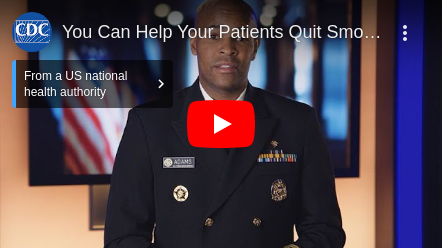Smoking Cessation: A Report of the Surgeon General
Partner Toolkit
Most of the 34 million adult Americans who smoke cigarettes want to quit. But smoking will remain the leading preventable cause of disease and death in the U.S. unless more is done to help them quit. In his new report, Smoking Cessation: A Report of the Surgeon General, VADM Dr. Jerome M. Adams calls on everyone, including healthcare professionals, health systems, employers, insurers, public health professionals, and policy makers, to take action to put an end to the staggering—and completely preventable—human and financial tolls that smoking takes on our country.
- Healthcare professionals can help patients quit smoking by:
- Advising them to quit
- Offering them brief counseling on how to quit
- Prescribing them cessation medications approved by the US Food and Drug Administration (FDA)
- Connecting them to additional resources, like a quitline
- Following up with continued support to help them stay quit
- Health systems can help people quit smoking by adopting policies and changes to integrate tobacco dependence treatment into routine care and to make it easier for healthcare teams to deliver treatment.
- Employers and insurers can help people quit smoking by providing insurance coverage for smoking cessation treatment that is comprehensive, barrier-free and widely promoted.
- Everyone,including public health professionals and policy makers, can support policies that help motivate people who smoke to quit and create an environment that supports quitting. These policies can include:
- Raising the price of cigarettes
- Adopting smokefree policies in workplaces, restaurants, and bars
- Running hard-hitting media campaigns on the dangers of smoking and secondhand smoke, and the benefits of quitting smoking
- Requiring graphic warning labels on cigarette packaging
- Funding comprehensive statewide tobacco control programs at CDC-recommended levels
- To read the full report, executive summary, and related materials, visit SurgeonGeneral.gov.
Use the messages below on your social media feeds.
- Twitter (Audience: People who smoke): Read the new report from @Surgeon_General on the benefits of quitting smoking and find proven tools to help you quit. CDC.gov/CessationSGR #CessationSGR
- Twitter (Audience: Healthcare Providers): The @Surgeon_General has released the first report focused solely on smoking cessation in 30 years. Read the report to get the latest science on what helps people quit smoking for good. CDC.gov/CessationSGR #CessationSGR
- Facebook (Audience: People who smoke): A new report from the nation’s doctor @USSurgeonGeneral looks at why quitting smoking can benefit your health and discusses proven treatments to help you quit for good. CDC.gov/CessationSGR #CessationSGR
Click on a Facebook or Twitter link above to open an image. Then right click the image and select “Save picture as…” to download the image.
- HHS Press Release
Surgeon General Releases First Report Focused on Smoking Cessation in 30 Years
Promote the feature article on social media, or use it as the basis of a newsletter article or e-blast to your stakeholders.
This feature article introduces the 2020 Surgeon General’s Report, the first one since 1990 to focus solely on the health benefits of quitting smoking. Since 1990, more research is available that confirms quitting smoking entirely is still the best way to improve your current and future health.
These four fact sheets summarize top-line messages from the report. You can include the fact sheets in media kits, post them on websites, promote them via social media, or print them as handouts at presentations or conferences.

What You Need To Know About Quitting Smoking
This plain-language booklet is written for the general public, particularly those who smoke. It highlights key findings from the report, presents them in an understandable way, and includes links to free resources people can use to help them quit smoking.
Promote the guide on social media and post it on your website, or use content from the guide to develop newsletter articles, blog posts, or other stakeholder communications.

These videos feature the Surgeon General speaking directly to smokers or to healthcare providers. Share these videos on social media, post them on your websites, or show them at meetings/conferences.

This presentation was created to provide partners with a resource that can be used to promote the report. The presentation highlights what’s new in the report, a chapter outline, background on its scientific development, the major conclusions, actions that stakeholders can take to support and enhance cessation, and key takeaways from the report.
This printable 6 x 9 inch postcard summarizes key issues covered in the report. It also includes links to more information about the report and resources to help promote and support cessation.
Download and print* (PDF–393 KB) to distribute at meetings or conferences.
*NOTE: This PDF is provided for PRINTING ONLY.


Healthcare Professionals
Tools and smoking cessation resources that can help healthcare professionals ensure that their patients have the right resources to begin their quit journeys.

Health Systems
Information on the basics of health systems change, with ideas and useful resources to help health systems and practices increase the reach and effectiveness of tobacco cessation interventions.

Insurers
Information on the evidence base for tobacco cessation insurance coverage, best practices for designing cessation coverage, and state case studies of expanding Medicaid cessation coverage and services.

Employers
Information on effective workplace health programs and policies, including information on tobacco cessation programs and smokefree workplace policies.























